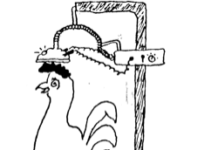Things are unglued in our country, recalling a cleavage that set people apart when Sen. Joe McCarthy went on his rampage about communist ghosts lurking in the government. That stage play in the 1950s exposed McCarthy as a whiskey-soaked fraud, full of hot air and fear-mongering. During his short run, McCarthy and his gangs left a lot of lives in ruin.
The split today is about one belief bumping chests with another over our pitted political landscape. At the core is a magnet called faith, and somehow religion gets dragged into it. Soon enough, emanating from the seat of government is the implication that faith, religious and political, is a condition – even a precondition – of the democratic life. Those who believe are in the fold. Those who don’t are outcasts.
A democracy, as I understand it, is a society in which those who do not believe can feel undisturbed and at home. There may be only a half-dozen unbelievers in Kansas or America who decline to embrace a certain religion or political fever dream, but their well-being is a test of our democracy, and their tranquility would be its proof. Today we have the repeated suggestion that only the good and faithful embrace certain strictures of politics or religion, and that devotion to one leader or one kind of faith is a precondition of the American way of life.
This has disturbed a lot of people, especially those who prefer to believe a different way, or who prefer to keep their beliefs in a sacred place and not brandish them on their lapels or on a bumper sticker. Nonetheless, political leaders live on political faith; when they advocate or pretend to advocate religious faith as much the same, they make some people uncomfortable. The point of democracy is that no one should feel uncomfortable.
*
During the constitutional convention in June,1787, George Mason said that representatives should be drawn from the people. “It should be so much so, that even the diseases of the people should be represented…if not, how are they to be cured?”
These noble words have endured. They reject imposing even the hint of standard for political rectitude, knowing that it would invite people in authority to set standards for human behavior. And yet that is happening today.
Democracy itself is a religious faith, and for some it’s the only formal religion they have. Today’s power mongers propose to establish new standards for political rectitude. Vigilantes are hard at work composing lists and deciding who’s a socialist or a fascist, who’s left or right, and who fails all the loyalty tests. This happens with little or no awareness of what the terms really mean, or their true definition through the ages.
Is “conservatism” the big new correct thing, as it was in the 1950s and ’60s, and is “liberal” to mean something untrustworthy, or shady? Today’s firebrands, left and right, have that special fever, one that creates sensational headlines and turns page one into a gallows for daily hangings; this is often with the help of the press that at times seems unnecessarily cooperative in publicizing such grim rites.
*
A half-century ago the United States Supreme Court decided the New York school prayer case. The public reaction was violent and accusatory; the Court was throttling religious life in America and the country was heading to Hades. But the Court was simply reminding us of the simple theme that ennobles our Constitution – that no one should be made to feel unsafe or uncomfortable because he or she does not conform. Public Schools had offered a moment of gentle orthodoxy in the classroom, but here and there a child had been left out in the cold with the stigma of being different. This is the person, in this case a child, that concerns our Constitution – his or her tranquility, health, safety, conscience.
Faith is not about allegiance to one person or one brand. It has evolved from among the principles in America’s founding document. It imagines a steadily growing book of democracy with all its passions, its distortions and dissents, its excesses and special interests – a kind of faith in bedlam, a haunting sense of a goal, an order of goodness and rationality.
That’s the hope, anyway. And in the space of time, a fresh one. Meanwhile, frustration is democracy’s middle name, and a lot of us worry about it. History has told us that eventually things clarify themselves, a more steady destination is revealed and life takes form through a simple process of elimination.




